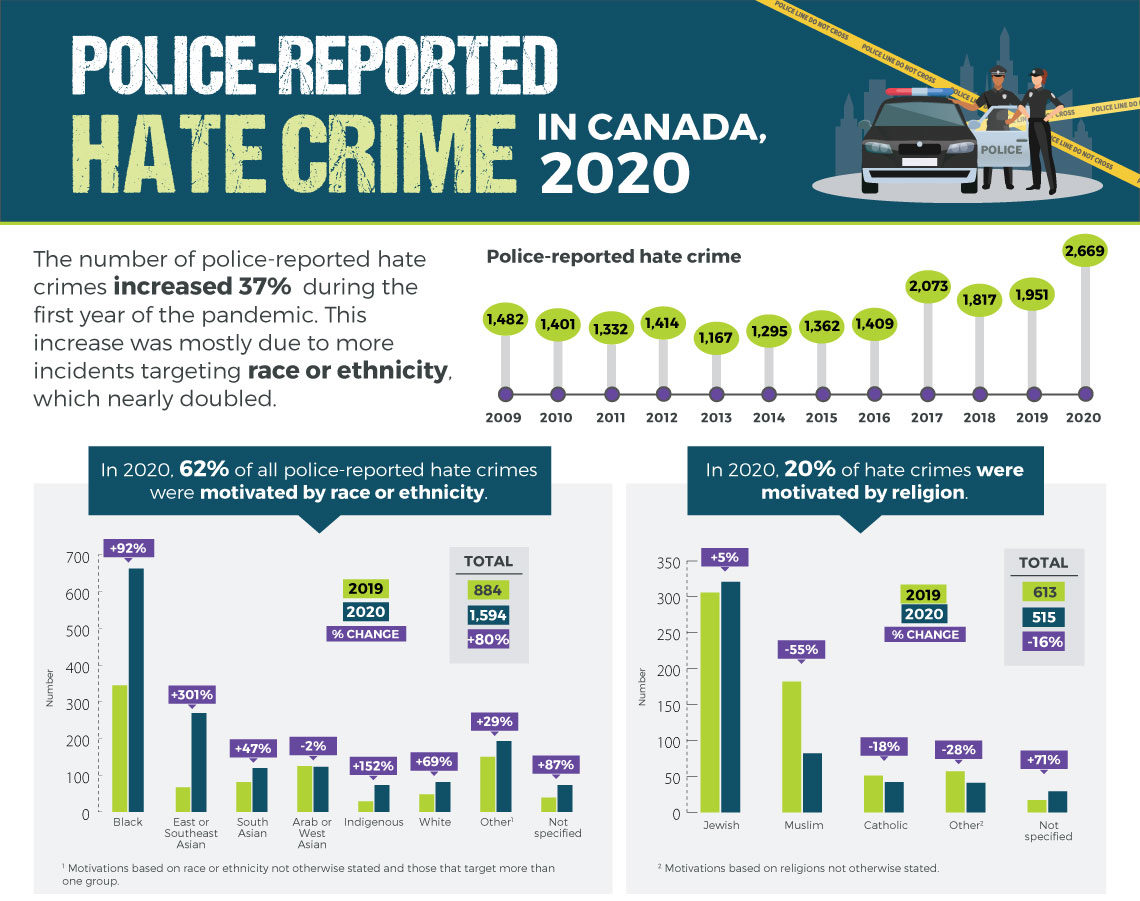The number of police-reported hate crimes rose to a new high in 2020, with Jews continuing to be the most victimized religious group, according to a report released by Statistics Canada March 17.
A total of 2,669 incidents were reported in 2020, an increase of 37 percent over the previous year and the largest number since 2009 when this data was available.
Overall, the Black community was the most frequent target of hate crimes (26 percent), followed by the Jewish community (13 percent) and the East or Southeast Asian population (11 percent). The number of hate crimes targeting Jews increased slightly in 2020, to 321 incidents, up from 308, the previous year.

Some of the increase in hate crimes was attributed to the social and economic disruptions caused by COVID, the report states.
“As with many groups, throughout the pandemic there have been reports of discrimination targeting the Jewish and Muslim populations as a result of disinformation and conspiracy theories related to the pandemic, often tied to broader anti-Jewish or anti-Muslim theories or beliefs.”
Reported hate crimes against Muslims decreased in 2020, dropping to 82 incidents, from 182 the previous year.
The Statistics Canada report pointed to two national summits in 2021, which focused on developing strategies to combat antisemitism and Islamophobia.
The pandemic was also cited as a factor in the rising number of hate crimes against Southeast Asians, which skyrocketed to 269 reported incidents, up from 67 the previous year.
The rising number of hate crimes reported in Canada, as well as the fact that Jews consistently remain one of the most targeted groups in society, despite comprising just 1 percent of the country’s population, have left Jewish communal leaders concerned.
“This report should be a call to action for all Canadians to stand against hate and antisemitism. The Jewish community experienced a significant spike in antisemitic incidents across the country in May 2021, further underscoring the need for concerted efforts to stop this worrying trend,” Shimon Koffler Fogel, CEO of the Centre for Israel and Jewish Affairs, said in a statement.
“We are grateful that police services across the country take these incidents seriously, but more needs to be done to prevent them and protect vulnerable communities. This includes greater support for security and safety at community institutions such as houses of worship; criminalization of Holocaust denial, which is a gateway to hate; and a national strategy to target online hate and radicalization.”
Statistics Canada also analyzed hate crime reports from 2011-2020 and found that that 85 percent of hate crimes targeting the Jewish community were non-violent. The most common violent crime was uttering threats.
The report also noted the growing incident of cybercrimes, which accounted for 7 percent of hate crimes in 2020.
“Of the 575 hate crimes that were also recorded by police as cybercrimes between 2016 and 2020, these most commonly targeted the Muslim population (16 percent), the Black population (15 percent), a sexual orientation (13 per cent), and the Jewish population (13 percent),” Statistics Canada reported.
Social media also reflected the growing wave of radicalization. The Stats Can report cited a project by the federal government and the company Moonshot CVE (Countering Violent Extremism) to redirect people searching for extremist content online.
“Weekly searches for violent ‘far-right’ keywords had increased since the beginning of the pandemic across six Canadian cities by an average of 18.5 percent,” Moonshot had reported, “Furthermore, there was evidence of an increase in Twitter discourse targeting China and Chinese people as well as anti-Jewish and conspiracy theory content.”
